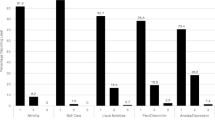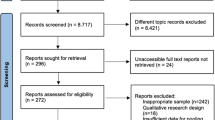Summary
Issues of quality of life (QOL) have often been considered for patients with insulin-dependent diabetes mellitus (IDDM, type I diabetes). Daily blood glucose monitoring and need for self-injections pose an obvious threat to the attainment of QOL, as does concern about long term complications. In contrast, non-insulin-dependent diabetes mellitus (NIDDM, type II diabetes) may be considered less severe, and has attracted less research interest. In fact, type II patients may also be aware of their heightened vulnerability to physical complications, as well as being affected by the need for heightened vigilance and attention to diet and exercise regimens.
Issues associated with the theory and development of QOL measures are discussed largely in relation to type I diabetes and cancer. Generic measures have advantages in allowing comparisons to be made across different disease groups, and are, therefore, often favoured by health economists. In contrast, disease-specific scales are more sensitive to changes in treatment regimens, and may therefore be the instruments of choice in evaluating new treatments.
In general, there has been less attention paid to how the meaning of QOL changes throughout the lifespan, and our review of the literature therefore emphasises a developmental perspective when considering the processes through which diabetes may affect an individual’s QOL. Measures which, at the least, take into account changes in meaning of QOL throughout the lifespan need to be developed.
Similar content being viewed by others
References
Diabetes Control and Complications Trial Research Group. The effect of intensive treatment of diabetes on the development and progression of long-term complications in insulin-dependent diabetes mellitus. N Engl J Med 1993; 329: 977–86
Aaronson NK. Methodological issues in assessing the quality oflife of cancer patients. Cancer 1991; 67: 844–50
Genev NM, Flack JR, Hoskins JE, et al. Diabetes education: whose priorities are met? Diabet Med 1991; 9: 475–9
World Health Organization. World Health Organization constitution. In Basic documents. Geneva: World Healih Organization, 1948
Feinstein AR. Clinimetric perspectives. J Chronic Dis 1987; 40: 635–40
Bergner M, Bobbitt RA, Carter WB, et al. The Sickness Impact Profile: development and final revision of a health status measure. Med Care 1981; 19: 787–805
Bush JM, Kaplan RM. Health related quality of life assessment. Health Psychol 1982; 1: 61–80
Hunt SM, McWeen J, McKenna SP. The Nottingham Health Profile: subjective health status and medical consultations. Soc Sci Med 1981; 15: 221–9
Ware JH, Sherbourne CD. The MOS 36 item Short Form Health Survey (SF36). I. Conceptual framework and core item selection. Med Care 1992; 30: 473–83
Brazier JE, Harper R, Jones NMB, et al. Validating the SF-36 health survey questionnaire: new outcome measure for primary care. BMJ 1992; 305: 160–4
Ingersoll GM, Marrero DG. A modified quality of life measure for youths: psychometric properties. Diabetes Educator 1991; 17: 114–8
Challen AH, Davies AG, Williams RJ, etal. Measuring psychosocial adaptation to diabetes in adolescence. Diabet Med 1988; 5: 739–46
Natapoff J. Children’s views of health. Am J Public Health 1978; 68: 995–1000
Lloyd CE, Mathews KA, Wing RR, et al. Psychosocial factors and complications of IDDM. The Pittsburgh epidemiology of diabetes complications. Diabetes Care 1992; 15: 166–72
Andressen IL, Haug J, Jervell J, et al. Treatment of diabetes and quality of life: on possibilities of a more normalized style using an insulin pen for multiple injection therapy. Tidsskrift fur den Norske Laegeforening 1989; 109: 677–80
Hornquist JD, Witby A, Andersson PO, et al. Insulin pen treatment, quality of life and metabolic control: retrospective intra-group evaluations. Diabetes Res Clin Pract 1990; 10: 221–30
Nathan DM, Fogel H, Norman D, et al. Long-term metabolic and quality of life results wiih pancreatic/renal transplantation in insulin dependent diabetes mellitus. Transplantation 1991; 52: 877–84
St James PJ, Younger MD, Hamilton BD, et al. Unplanned pregnancies in young women with diabetes. Diabetes Care 1993; 16: 1572–8
Cappelli M, McGrath PJ, MacDonald NE, et al. Parental care and overprotection of children with cystic fibrosis. Br J Med Psychol 1989; 62: 281–9
Shaw NJ, McClure RJ, Kerr S, et al. Smoking in diabetic teenagers. Diabet Med 1993; 10: 275–7
Rodin J, Peyrot M. Psychological problems and interventions in diabetes. A review of the literature. Diabetes Care 1992; 15: 1640–7
Rodin GM, Daneman D. Eating disorders and IDDM. A problematic association. Diabetes Care 1992; 15: 1402–12
Jacobson AM, Leibovich JB. Psychological issues in diabetes mellitus. J Pediatr 1984; 110: 805–11
McCulloch DK, Yopung RJ, Prescott RJ, et al. The natural history of impotence in diabetic men. Diabetologia 1984; 26: 437–40
Ryan CM, Williams TM, Finegold DN, et al. Cognitive dysfunction in adults with type I (insulin dependent) diabetes mellitus of long duration: effects of recurrent hypoglycaemia and other chronic complications. Diabetologia 1993; 36: 329–34
Neil HAW, Thompson AV, Thorogood M, et al. Diabetes in the elderly: The Oxford Community Diabetes Study. Diabet Med 1989; 6: 608–13
Pegg A, Fitzgerald F, Wise D, et al. A community based study of diabetes-related skills and knowledge in elderly people with insulin-requiring diabetes. Diabet Med 1991; 8: 778–81
Elgrably F, Costagliola D, Chalow AJ, et al. Initiation of insulin treatment after 70 years of age: Patient status 2 years later. Diabet Med 1991; 8: 773–7
Author information
Authors and Affiliations
Rights and permissions
About this article
Cite this article
Eiser, C., Tooke, J.E. Quality of Life in Type II Diabetes. Pharmacoeconomics 8 (Suppl 1), 17–22 (1995). https://doi.org/10.2165/00019053-199500081-00005
Published:
Issue Date:
DOI: https://doi.org/10.2165/00019053-199500081-00005




